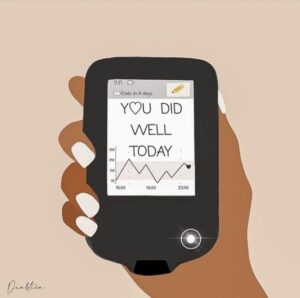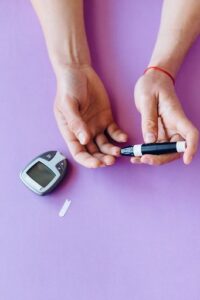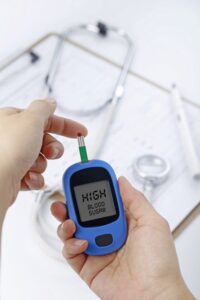When your body cannot release insulin, or there isn’t enough insulin for your body’s requirements, this chronic disease is termed diabetes. Insulin acts as a medium that lets your body use its blood sugar in moderate and healthy amounts.

Diabetes is a condition when your body lacks the amount of insulin required, or because of some reason, your body stops responding to the existing insulin, and your blood sugar becomes so high that it is harmful to you, this process can give birth to various deadly disorders like heart disorders and vision loss.
Humans haven’t yet discovered a cure for diabetes, but there are ways you can reduce health risks and stay healthy with diabetes. You should follow these tips for a better and healthier lifestyle.
- Take medicines on time
- Being active and working out
- Educating yourself about diabetes and medical support
- Making healthcare appointments regularly
WHAT ARE THE SYMPTOMS OF DIABETES?
You might be experiencing diabetes if you have the following symptoms:
·Frequent urination
·Increased thirst
·Unclear or blurred vision
·Feeling famished frequently
·Sexual issues
·Tingling and numb feet
If you are experiencing any of the above symptoms or signs, you should consult your doctor immediately and book an appointment as soon as possible.
WHAT HAPPENS WHEN YOU IGNORE DIABETES AND ITS SYMPTOMS
Diabetes is a chronic health disorder, and neglecting its presence and ignoring medical advice can result in many more disorders that will hinder your growth as a human.
Some of these possible complications are stated below:
- Eye Damage, called retinopathy
- Nerve damage, called neuropathy
- Extremely high blood sugar levels
- Heart disease
- Multiple infections
KINDS OF DIABETES
There are 3 common types of diabetes i.e. first type of diabetes, second type, and the last type is gestational diabetes which is for pregnant ladies; so, in this article, we will go deep into those topics.
WHAT IS THE FIRST TYPE OF DIABETES?
Type 1 diabetes is known to be a result of the body’s automatic reaction towards itself by mistake. It stops it from making insulin altogether! Only 10% of people who get diagnosed with diabetes have type 1 diabetes, and it can be diagnosed anytime, and age doesn’t really matter in this case.
Patients with type-1 diabetes are dependent on taking insulin injections all their lives to survive and live their lives. Right now, nobody really knows how to treat and prevent type-1 diabetes, and this condition is incurable as of now.
WHAT IS THE SECOND TYPE OF DIABETES?
The second type of diabetes is usually examined in the initial age of your life, and in this case, your body cannot produce enough insulin to meet your body’s requirements. A high percentage of people i.e. 95% diagnosed with diabetes have this type of diabetes, and it is usually in young adults, kids and teenagers. The symptoms of this type of diabetes might go unnoticed, so you need to get yourself tested for diabetes if you feel like you are at risk for it.
The second type of diabetes, unlike the first type, can be prevented and delayed by incorporating lifestyle changes. Some of them are listed below:
- Maintaining a healthy weight
- Healthy diet
- Being active and working out
GESTATIONAL DIABETES
Gestational diabetes, or diabetes for pregnant women, is usually diagnosed for those women who never had diabetic issue before and are pregnant. When you get diagnosed with gestational diabetes it is likely that your unborn child is at risk for many health complications in future, however, gestational diabetes goes away on its own after you give birth, but it also puts you at more risk for type-2 diabetes later in life.
DIABETES AND LONG-TERM COMPLICATIONS ASSOCIATED WITH IT
-
NEUROPATHY
Neuropathy is a nerve disorder that may occur as a result of diabetes. It can cause the loss of sensation in your limbs and arms, resulting in numbness and tingling in the affected areas. If left untreated for an extended period, you may permanently lose all sensation and control of your limbs.
2. Nephropathy
Our kidneys have a very delicate urine filtration system which is at direct threat for someone diagnosed with diabetes, it can harm and damage the filtration process and can also result in kidney failure and require dialysis to support the kidneys.
3. Retinopathy
Your eyes are in danger if you are at risk for diabetes because it can severely harm your eyes and even result in complete vision loss.
4. Cardiovascular Disease
The most significant health complication related to diabetes is related to your cardiovascular health; problems such as heart attack and disorders are a substantial threat to people diagnosed with diabetes in comparison to people who do not have diabetes.
According to research, people who are diagnosed with diabetes are more at risk for heart attacks and heart problems than people who are not at risk.
How can someone at risk minimize further health complications?
Diabetes is associated with a vast number of health risks and complications other than the disease itself, you can minimize your chances of encountering risks associated with diabetes by controlling your high blood sugar and living a healthy lifestyle.
Detecting complications early and diagnosing them earlier helps you to get a grip on your physical and mental health and minimize the potential damage that can happen if not paid attention!
DIABETES AND A HEALTHIER LIFESTYLE
Anyone suffering with diabetes should always keep in mind these points, and they can lead a healthy, every day and happy life like non-diabetics;
- Diet, medicines and nutrition
- Working out and physical activities.
- Blood glucose control
- Meditation and mindfulness
Many doctors insist on using herbal combinations to maintain a healthy lifestyle, but it is your personal choice on how you want to go forward with countering diabetes.
It is expected to feel like diabetes is ruining your life and controlling it, and you may feel helpless, worried and depressed because of your changed and unusual lifestyle.
You may get worried because your efforts are not getting results, and all of it may seem useless, or maybe you have discovered underlying health issues and can’t seem to handle them.
However it is entirely normal to feel hopeless and demotivated, but what is even more crucial is to take care of your mental health along with your physical health, and your mental health might be the least of your worries but looking after your mind and emotions is almost as necessary as looking after your body.
These unwanted and unwelcomed feelings of anticipation and distress are known as diabetes distress, and they may come to you anytime during your diabetic journey.
Contact your doctor. If you feel depressed, most doctors need to be made aware of diabetic distress if you continue to experience it and never hesitate from seeking professional medical help!


